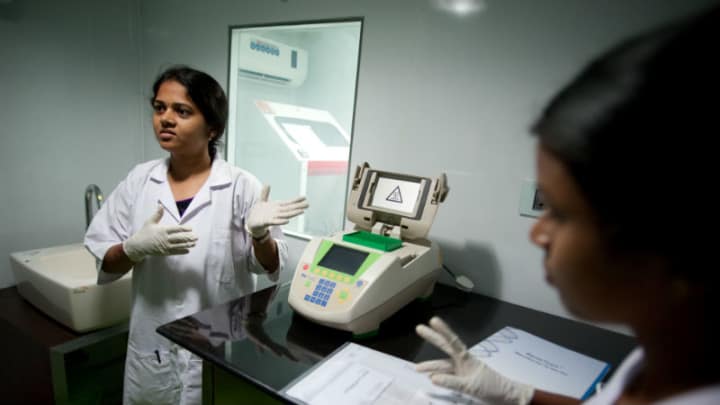
Three years ago, as the media displayed horrific scenes of people dying in the streets from the Ebola epidemic in West Africa, I helped World Bank President Jim Yong Kim convene an emergency summit on the crisis with the leaders of the three most affected countries and global finance and development ministers. Together with the U.S. government’s commitment of military troops and financing, that summit became a tipping point in mobilizing the international community to help Guinea, Liberia, and Sierra Leone stop the outbreak. However, the months-long delay to get to this point proved very costly: more than 11,000 deaths and an estimated tens of billions of dollars in lost economic growth and in humanitarian and development assistance for Ebola response and recovery.
Since then, multiple blue-ribbon panels and reports have put forth the lessons learned on the changes the world must make to prevent future outbreaks with pandemic potential. The good news is that, unlike when previous alarm bells went unheeded a decade ago following the SARS and H1N1 outbreaks, the world is waking up and taking meaningful action toward strengthening pandemic preparedness.
Yet this nascent progress is also at risk. As political leaders and priorities shift in the U.S. and other countries, and outbreaks disappear from the headlines, the urgency of investing in preparedness fades. But just as a commander would not pull troops off the battlefield in the middle of a war, now is not the time to pull back our defenses against pandemic threats.
US leadership critical to progress
Over the past three years, several international initiatives have been set up to advance global health security, from the Pandemic Emergency Financing Facility at the World Bank Group and the Contingency Fund at the World Health Organization to the Coalition for Epidemic Preparedness Innovations, and pandemic simulations with global leaders at the G-20 and elsewhere. The Global Health Security Agenda, a U.S.-initiated partnership, has grown to more than 60 nations plus nongovernmental organization members such as my organization, PATH. And through the Joint External Evaluation Alliance, 58 countries and counting have undertaken external assessments of the gaps in their health systems and preparedness as of October 2017.
Working toward global health security: Strategies and challenges
While globalization is a boon to business and economic growth, it also means that diseases have the potential to travel quickly and unpredictably, making global health security more important than ever before. Devex looks at some of the challenges and strategies that different stakeholders are using to improve health security worldwide.
U.S. leadership and financing has been a critical factor in the progress we’ve seen so far. Thanks to such support, Cameroon, for example, has been able to reduce the time it takes to respond to outbreaks from eight weeks to just 24 hours, while the Democratic Republic of the Congo has set up its first health emergency operations center. This rapid response capability can mean the difference between an isolated outbreak and a global catastrophe.
The Trump administration and Congress should continue to prioritize investments in global health security and come together behind a comprehensive strategy that is adequately funded, as outlined in a new report.
Sustained funding is needed
Top priority should be given to building the preparedness of low- and middle-income countries — where the next deadly outbreak is most likely to occur due to weak health systems. This will require sustained investments. Yet a looming fiscal cliff threatens progress, much of which was made possible by Ebola supplemental financing that is slated to run out at the end of FY 2019. The administration and Congress should ensure that these vital investments in prevention continue beyond 2019 — a much less costly option than responding to an outbreak that is already spiralling out of control.
This spring, Congress appropriated money for an emergency reserve fund to enable the U.S. government to mount an early and rapid response to emerging pandemic threats abroad. This was a smart move, but the fund should not become interchangeable with previously allocated funding or borrowed from other global health or development programs, which would simply derail progress in other critical areas.
A pipeline of new tools is essential to winning the fight
Research and development is another strategic investment to advance global health security. Just as the military does not wait until war begins to design new fighter jets and battleships, a robust pipeline of next-generation health technologies — including vaccines, diagnostics, drugs, and other tools — for current threats and emerging diseases will enable the U.S. and partner countries to prevent an outbreak from becoming a pandemic. A recent report shows how investments in R&D for emerging infectious diseases offer the double benefit of improving global health and bolstering the country’s economy.
Global health programs must be part of the arsenal
Finally, global health programs that are not traditionally thought of as “epidemic preparedness” — such as those designed to deliver vaccines, fight HIV and AIDS, polio, tuberculosis, and malaria, and to reach mothers and children with quality care — should also be considered part of our global health security arsenal, by strengthening frontline health services and bolstering treatment and prevention capabilities in some of the most vulnerable settings.
PATH and our partners are heartened by the recent comments from U.S. Secretary of State Rex Tillerson, affirming the Trump administration’s continuing commitment to the GHSA. But these words will ring hollow unless they are backed up by the necessary financial and diplomatic resources.
It’s not a question of if, but when, we will face another pandemic threat. The only question is whether the U.S. and the world will stay focused and do what it takes to make sure we are prepared — before the next big one hits.
Examining how global health affects security and vice versa, Devex, PATH, and Johnson & Johnson look at how country governments, donors, foundations, the private sector, and civil society can better respond and anticipate threats, asking whether increased investment in global health security is critical to the security of all countries. Join our conversation on preparing for the unexpected by visiting the From Healthy to Secure site and tagging #Health4Security and @Devex on social.




